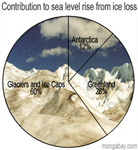FEATURED ARTICLES [Latest news updates]
Longest-running Amazon rainforest experiment imperiled by colonization

|
|
(07/25/2007) One of the world's most important and longest-running scientific experiments is under threat by new colonization proposed by the Brazilian government, warn researchers writing in the journal Nature. The Biological Dynamics of Forest Fragments Project, an experiment launched outside the Brazilian city of Manaus more than 25 years, has helped researchers understand the impacts of deforestation and fragmentation on the complex ecology of the world's largest and most biodiverse rainforest: the Amazon. But now a colonization scheme sanctioned by the Brazilian federal agency SUFRAMA threatens to undermine the basis for decades of critical research.
[
Amazon | Deforestation]
An interview with Dave Benton of the Marine Conservation Alliance
In Alaska, fishing industry drives marine conservation

|
|
(07/25/2007) Alaska's fisheries are some of the richest in the world, with fishermen harvesting hundreds of millions of dollars' worth of salmon, crab, herring, halibut, pollock, and groundfish every year. However, such bounty has not always been the case. Over-exploitation and poor fisheries management in the 1940s and 1950s took a heavy toll on the industry. Born of this difficult origin, today Alaska sets the bar in fisheries management. Unusually for natural resource management, industry is leading the way, relying on dialog with scientists to determine catch levels and where to designate "no-fishing zones", while pushing for certification standards for sustainable seafood products. These efforts are coordinated by the Marine Conservation Alliance (MCA), an industry-backed nonprofit based in Juneau, Alaska. In July 2007, David Benton, executive director of the Marine Conservation Alliance, spoke with mongabay.com about MCA's work in Alaska.
[
Interviews | Marine Conservation | Oceans]
Is peat swamp worth more than palm oil plantations?
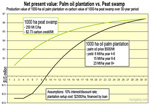
|
|
(07/17/2007) Could peat swamp be worth more intact for their carbon value than palm oil plantations for their oil? Quick analysis suggests yes, though binding limits on emissions will be needed to trigger the largest ever flow of money from the industrialized world to developing countries. At stake: the bulk of the world's biodiversity.
[
Featured | Carbon finance | Indonesia]
An interview with the Monterey Bay Aquarium's Mike Sutton:
How to save the world's oceans from overfishing

|
|
(07/09/2007) Global fishing stocks are in trouble. After expanding from 18 millions tons in 1950 to around 94 million tons in 2000, annual world fish catch has leveled off and may even be declining. Scientists estimate that the number of large predatory fish in the oceans has fallen by 90 percent since the 1950s, while about one-quarter of the world's fisheries are overexploited, depleted, or recovering from depletion. Despite these dire trends, the situation is changing. Today some of the world's largest environmental groups are focused on addressing the health of marine life and oceans, while sustainable fisheries management is at the top of the agenda for intergovenmental bodies. At the forefront of these efforts is Mike Sutton, director of the Monterey Bay Aquarium's conservation program: the Center for the Future of the Oceans. The aquarium, which has long been recognized as one of the world's most important marine research facilities, is pioneering new strategies for protecting the planet's oceans. Sutton says the approach has four parts: establishing new marine protected areas, pushing for ocean policy reform, promoting sustainable seafood, and protecting wildlife and marine ecosystems.
[
Featured | Interviews | Marine conservation | Oceans]
Poverty and corruption reduce effectiveness of rainforest parks

|
|
(07/09/2007) Poverty and corruption are linked to higher incidence of fire in tropical forest reserves, reports a new study published in the journal Ecological Applications. Poor, corrupt countries -- like Cambodia, Guatemala, Paraguay, and Sierra Leone -- have the least effective parks when measured in terms of the incidence of fire relative to surrounding "buffer" areas. The findings have significant implications for rainforest conservation efforts.
[
Featured | Rainforests | Conservation | Protected areas | Forest fires]
Inflatable concentrators may cut cost of solar below conventional power plants

|
|
(07/08/2007) Cool Earth Solar, a Livermore, California-based company developing an innovative way for capturing solar energy, has merged with Radiant Energy, a developer and owner of renewable and clean energy power plants including solar, geothermal, and hydroelectric. Rob Lamkin, CEO of Radiant Energy, says the merger will help ramp up the technology, which uses inflatable solar concentrators to minimize use of refined silicon, a costly ingredient in solar cells. Lamkin says the technology could dramatically reduce the cost solar energy, bringing it below the cost natural gas-fired power plants.
[
Energy | Solar power]
Forest disturbance reduces biodiversity in the Amazon rainforest
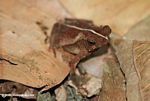
|
|
(07/02/2007) Two new studies in the Amazon rainforest show that plantation forests and second-growth forests have lower species counts for butterflies, reptiles, and amphibians than adjacent primary forest areas. The research has important implications for conservation of tropical biodiversity in a world where old-growth forest is increasingly replaced by secondary forests, industrial plantations, and agricultural landscapes.
[
Biodiversity]
450 years of Amazon research reviewed
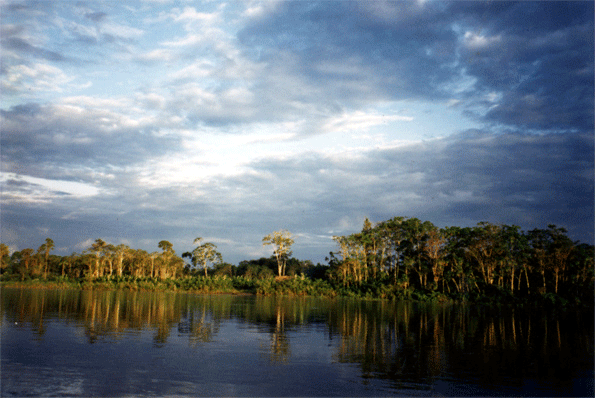
|
|
(07/02/2007) Research on the Peruvian Amazon is largely inaccessible to the people who could make most use of it, reports a comprehensive review of 2,202 texts published over the past 450 years on the Madre de Dios region of southwestern Peru. The study recommends the establishment of "a Web-based digital library for Neotropical nature" to make research more widely available.
[
Amazon | Conservation]
Pro-poor conservation
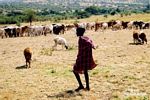
|
|
(07/01/2007) Biodiversity conservation is often associated with the protection of charismatic animals and beautiful landscapes. Missing is consideration of the role that biodiversity plays in the livelihoods of hundreds of millions of people around the world, who rely on hunting, plant collection, and other services afforded by biodiversity for everyday subsistence.
[
Conservation | Sustainable development]
Humans appropriate 24% of Earth's productivity

|
|
(07/25/2007) Researchers have developed the first geographically detailed analysis of humankind's impact on the biosphere, as represented by a metric known as HANPP or human appropriation of net primary production. The results are presented and discussed in two papers published in the July 6 online edition of the journal Proceedings of the National Academy of Sciences.
[
Sustainability]
Mongabay for kids launches in Javanese, Norwegian
(07/25/2007) With thanks to Indie from Indonesia and Matti Richoux of Rainforest Foundation Norway, the mongabay rainforest site for kids has launched in Javanese and Norwegian. The kids' site is now available in 23 languages
[
Non-English languages]
Coal mining threatens the "Heart of Borneo"
(07/25/2007) Coal mining in Borneo imperils the island's fast-disappearing forests and threatens to undermine the effectiveness of an monumental conservation initiative, according to a report from the The Sunday Times and Parliamentary testimony.
[
Borneo]
"Virgin" rain forests of Costa Rica a misnomer

|
|
(07/25/2007) Radiocarbon dating of montane forest soils in Costa Rica uncovered evidence of charcoal that shows its otherwise "virgin" tropical forests are less than 200 years old. The findings, published in the journal Biotropica, have implications for the re-establishment of rain forests after clearing.
[
Costa Rica | Deforestation | Fires | Rainforests]
Rare gorillas slaughtered in mass killing
(07/25/2007) Coal-fired power plants are fast being shelved as environmental concerns mount, reports the Wall Street Journal.
[
Coal | Energy]
Jumbo squid invade California waters, affecting fish populations
(07/25/2007) Jumbo squid (Dosidicus gigas) are invading California waters, putting commercial fish populations at risk, reports a study published in Proceedings of the National Academy of Sciences.
[
Squid | Oceans]
Rare gorillas slaughtered in mass killing

|
|
(07/24/2007) At least four critically endangered gorillas have been killed in Democratic Republic of Congo's Virunga National Park. National Geographic News reports they were shot "execution-style". Illegal charcoal harvesters are leading suspects in the slaying. Two other gorillas are missing and feared dead.
[
Gorillas | Poaching]
Wal-Mart demand drives "greener" shrimp farms
(07/24/2007) Wal-Mart's demand for sustainably-produced products is driving "greener" production of shrimp in Thailand, reports the Wall Street Journal (WSJ).
[
Aquaculture | Green business]
Fish cultivate gardens of algae
(07/24/2007) Damselfish cultivate "gardens" of algae, according to a study published last October in the journal Biology Letters.
[
Animal behavior | fish]
Rare jungle deer photographed for the first time
(07/24/2007) A camera trap has captured the first ever pictures of an elusive forest deer in its natural habitat, reports the Wildlife Conservation Society (WCS).
[
Mammals]
Australia funds first global deforestation monitoring system

|
|
(07/23/2007) At a High Level Meeting on Forests and Climate being held in Sydney, Australia today announced a series of measures to slow deforestation and fight global warming. Australia said it will commit AU$10 million ($US8.8) to support efforts to reduce greenhouse gas emissions from deforestation and promote sustainable forest management in Indonesia. The Australian government also said it would push the development of a new global system to monitor changes in forest cover and forest carbon levels as well as contribute AU$11.7 million ($US10 million) to the World Bank's new Global Forest Alliance, a program that seeks to bolster compensation for tropical countries that help slow carbon emissions by reducing deforestation rates.
[
Australia | Carbon finance | Deforestation]
Human-induced climate change causes shifts in rainfall
(07/23/2007) Human-induced climate change has caused changes in rainfall patterns around the world over the past century, claims a new study published in Nature.
[
Impact of climate change]
Laptop for poor children set for mass production
(07/23/2007) The "$100 laptop" is set to go into mass production after the One Laptop Per Child Foundation (OLPC) received orders for 3 million machines, the requisite number to make the project viable.
[
OLPC]
Melting glaciers and ice cap will drive sea level rise
(07/23/2007) Melting glaciers and ice caps will contribute more to global sea level rise this century than the melting of the Greenland and Antarctic ice sheets, reports a study published in the current issue of Science. Analyzing satellite, aircraft and ground-based data from glaciers, ice caps, the Greenland ice sheet, the West Antarctic ice sheet and the East Antarctic ice sheet, an international team of researchers found that about 60 percent of total global sea rise from ice loss can be attributed to glaciers and ice caps, 28 percent from Greenland, and 12 percent from Antarctica. The authors conclude that Greenland will not catch up to glaciers and ice caps in terms of sea level rise contributions until the end of the century.
[
Sea levels | Glaciers]
Plug-in hybrid electric vehicles will cut pollution, emissions, oil use
(07/20/2007) Plug-in hybrid electric vehicles (PHEVs) could reduce greenhouse gas emissions and improve air quality significantly by 2050, reports a new study by The Electric Power Research Institute (EPRI) and the Natural Resources Defense Council (NRDC).
[
Plugin hybrids | Automobiles]
Melting glaciers and ice cap will drive sea level rise
(07/19/2007) Melting glaciers and ice caps will contribute more to global sea level rise this century than the melting of the Greenland and Antarctic ice sheets, reports a study published in the current issue of Science. Analyzing satellite, aircraft and ground-based data from glaciers, ice caps, the Greenland ice sheet, the West Antarctic ice sheet and the East Antarctic ice sheet, an international team of researchers found that about 60 percent of total global sea rise from ice loss can be attributed to glaciers and ice caps, 28 percent from Greenland, and 12 percent from Antarctica. The authors conclude that Greenland will not catch up to glaciers and ice caps in terms of sea level rise contributions until the end of the century.
[
Sea levels | Glaciers]
Dinosaurs' rise to dominance was a gradual
(07/19/2007) Dinosaurs' rise to dominance was a gradual rather than sudden, suggests new research published in Science.
[
Dinosaurs | Fossils]
Gecko + mussels = biomimetic underwater adhesive
(07/19/2007) Assessing fines on illegal bycatch could help clean up the fishing industry, reports a new study published in the August issue of Frontiers in Ecology and the Environment.
[
Biomimicry]
Blue macaw population stages remarkable recovery in Brazil
(07/18/2007) Assessing fines on illegal bycatch could help clean up the fishing industry, reports a new study published in the August issue of Frontiers in Ecology and the Environment.
[
Birds]
Pound of beef produces 36 pounds of CO2 emissions

|
|
(07/18/2007) The production of a kilogram of beef is results in more greenhouse gas emissions and other pollution than driving a car for 3 hours while leaving all the lights at home, concludes a new study led by Akifumi Ogino of the National Institute of Livestock and Grassland Science in Tsukuba, Japan. The research is detailed in this week's issue of New Scientist Magazine.
[
Agriculture | Cattle ranching | Carbon dioxide]
Fines on bycatch could help make conservation groups, industry accountable
(07/18/2007) Assessing fines on illegal bycatch could help clean up the fishing industry, reports a new study published in the August issue of Frontiers in Ecology and the Environment.
[
Oceans | Fishing]
Corn ethanol is not the solution to energy independence
(07/18/2007) A new report claims that corn ethanol will not significantly offset U.S. fossil fuel consumption without "unacceptable" environmental and economic consequences.
[
Biofuels | Ethanol]
Foreign fishing fleets deplete African fish stocks
(07/18/2007) Heavily subsidized foreign fishing fleets are depleting coastal fish stocks of poor Africa countries, reports The Wall Street Journal.
[
Oceans | Fishing]
Hurricanes can help coral reefs
(07/17/2007) A close call with a hurricane can be beneficial to a stressed coral reef, reports a study published in Proceedings of the National Academy of Sciences (PNAS).
[
Coral reefs | Hurricanes]
'Extinct' egg-laying mammal rediscovered in jungles of New Guinea
(07/16/2007) An egg-laying mammal thought extinct for nearly 50 years has been rediscovered in the Indonesian province of Papua on the island of New Guinea, reports BBC News.
[
Species Discovery | New Guinea]
Toll road could raise money for Amazon conservation
(07/15/2007) Southeastern Peru is arguably the most biodiverse place on the planet. A new highway project, already under construction, poses a great threat to this biological richness as well as indigenous groups that live in the region. While its too late to stop the road, called the Carretera Transoceanica or Interoceanic Highway, there are ways to reduce its impact on the forest ecosystem and its inhabitants. A new proposal, backed by a group of well-respected researchers, argues that turning parts of the highway into a toll road could help pay for conservation efforts that will mitigate damage to the surrounding rainforest.
[
Congo | Logging]
Procter & Gamble looks to poor markets for growth
(07/15/2007) Procter & Gamble Co. is aggressively expanding into "bottom of the pyramid" markets in an effort to grow sales, reports Monday's edition of The Wall Street Journal. The consumer products giant is formulating products specifically for some of the world's poorest people.
[
Poverty]
Polar bears avoiding sea ice for cub dens
(07/15/2007) Polar bears in Alaska are increasingly setting up dens on sea on land because sea ice is thinning, reports a new study by U.S. Geological Survey (UCGS) researchers.
[
Polar bears]
NASA images show expansion of logging in Congo rainforest

|
|
(07/15/2007) New high resolution images of logging roads in the Congo region of Africa are helping researchers understand the expansion of industrial logging in Central Africa. Using highly detailed images from NASA and commercial satellite firms, scientists from the Woods Hole Research Center (WHRC) created a map of logging roads and forest disturbance across 4 million square kilometers of tropical African forests between 1976 and 2003.
[
Congo | Logging]
Florida to cut greenhouse gas emissions 80% by 2050
(07/15/2007) Florida plans to cut greenhouse gas emissions 80 percent from 1990 levels by 2050 according to Charlie Crist, Florida's Republican state governor. Due to its low elevation and hurricane risk, global warming may pose the biggest risk to Florida of any U.S. state.
[
Environmental politics]
Wildlife tourism can be detrimental to monkeys
(07/15/2007) Tourism is causing changes in primate behavior and may be increasing infant mortality and the transmission of disease, reports a study published in the October edition of the International Journal of Primatology. The 19-year study adds to a growing body of work that suggests some forms of wildlife tourism are detrimental to primate populations, facilitating disease transmission, disrupting social behavior, and causing habitat destruction.
[
Ecotourism | Monkeys]
Fish site launches in Japanese
(07/15/2007) Sections of the tropical freshwater aquarium fish site have launched in Japanese.
[
Mongabay in non-English languages]
China's paper recycling industry can help shield forests from destruction
(07/15/2007) China's massive paper recycling capacity is helping shield global forests worldwide from destruction by supporting an international market for wastepaper as an alternative to pulpwood, says a new report released by Forest Trends, an international forestry organization. Nevertheless, wastepaper alone is not enough to meet demand from China's growing paper industry.
[
China]
U.S. official says Brazilian ethanol doesn't increase food prices, destroy Amazon

|
|
(07/13/2007) Brazil's surging ethanol production does not put the Amazon rainforest at risk and is not fueling higher food prices, claimed a U.S. energy official visiting Brazil. Scientists say while rainforest is not directly cleared for sugar cane plantations, expanding production is pushing smallholder farmers into more marginal areas, including the cerrado grassland and rainforests of the Amazon basin.
[
Brazil | Biofuels | Ethanol]
Glaciers in western China shrank 20% in 40 years
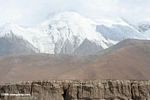
|
|
(07/13/2007) Glaciers in Western China have melted at "alarming" rates over the past 40 years, according to Chinese state media. Xinhua reports that Wang Feiteng, an assistant researcher with the Tianshan Mountain glacier monitoring station under the Chinese Academy of Sciences (CAS), said the principal glacier at Tianshan has lost 20 million cubic meters of ice in the last four decades, and the east and west sections of the glacier are receding by 3.5 meters (11 feet) and 5.9 meters (19 feet), respectively every year.
[
China | Glaciers]
Intel joins forces with $100 laptop project for poor children
(07/13/2007) Intel has teamed with the One Laptop Per Child (OLPC) program, agreeing to contribute funding and join the board of the nonprofit group that seeks to bring low-cost laptops to children in poor countries, reports the Associated Press. The announcement comes after Intel chairman Craig Barrett criticized the project in an effort to boost support for its own child-focused Classmate PC.
[
OLPC | Technology]
Killers of renowned anthropologist sentenced in Brazil

|
|
(07/12/2007) The men charged with the 2005 killing of University of Vermont anthropology professor James Petersen in the Amazon rainforest were sentenced Tuesday to nearly 30 years in prison, close to the maximum under Brazilian law. Petersen, who had been doing pioneering research on advanced civilizations in the Amazon rainforest and had become a popular figure in the region, was shot and killed on August 13, 2005 during a robbery near Iranduba, a small town in the Brazilian Amazon.
[
Amazon]
Cosmetics retailer announces sustainable palm oil initiative

|
|
(07/12/2007) The Body Shop International today introduced a sustainable palm oil initiative, the first for the beauty industry. The company said the move was spurred by growing concerns over the impact of oil palm plantations on biodiversity. The Body Shop will now source its palm oil to a Daabon, a certified organic producer in Colombia.
[
Green business | Palm oil]
Agents of death for wildlife become jewelry in Zambia

|
|
(07/12/2007) Craftswomen in Zambia are turning snares formerly used to illegal kill wildlife into jewelry. Called "snareware", the handmade jewelry is part of a program that has grossed $350,000 for rural communities and helped protect endangered wildlife by taking 40,000 snares and 800 firearms out of the hands of poachers.
[
Poaching | Sustainable development]
Can organic farming feed the world?
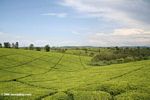
|
|
(07/12/2007) Contrary to popular belief, organic farming can produce enough to feed the world, reports a new study published in Renewable Agriculture and Food Systems. Researchers from the University of Michigan found that in developed countries, organic yields were almost equal to those from conventional farms, while organic methods could double or triple food production in developing countries.
[
Impact of climate change]
How will climate change impact the U.S. Northeast?
(07/11/2007) The Northeastern United States could experience widespread changes from global warming if greenhouse gas emission are not significantly reined in, warns a new report from the Union of Concerned Scientists (UCS) and a team of more than 50 scientists and economists.
[
Impact of climate change]
How long does it take reef fish to recover from overfishing?
(07/11/2007) Recovery of fish populations from overfishing can take decades, reports a new study based on 37 years of observations.
[
Marine conservation]
Miscanthus bests switchgrass as biofuel source
(07/11/2007) In a side-by-side comparison, miscanthus (Miscanthus x giganteus) grass has been shown to be a more productive bioenergy source than switchgrass (Panicum virgatum), according to research presented at the annual meeting of the American Society of Plant Biologists in Chicago.
[
Biofuels]
Experts: sun not linked to current global warming
(07/11/2007) Changes in the sun's output is not linked to recently observed global warming, reports a study published in Royal Society's journal Proceedings A.
[
Climate change]
Indonesia's peat swamps worth $39B/year
(07/11/2007) Indonesia's peat swamps are worth $39 billion in carbon credits per year, according to rough calculations by Bloomberg.
[
Carbon finance | Indonesia]
China calls for sustainable logging by Chinese firms overseas
(07/11/2007) China unveiled a draft sustainable forestry handbook for Chinese companies operating overseas. The move comes as the country faces increasing criticism from environmentalists who say China's booming demand for timber and other materials is destroying the world's tropical forests.
[
China]
Giant squid found in Australia
(07/11/2007) A giant squid has washed up on a beach on the western coast of the Australian island Tasmania, reports Reuters.
[
Squid]
Climate change fueled ancient wars in China
(07/10/2007) A new study ties past climate change to warfare in ancient China. Writing in Human Ecology, David Zhang from the University of Hong Kong and colleagues show that warfare frequency in eastern China between 1000 and 1911 A.D. was significantly correlated with temperature oscillations.
[
China]
Ford Motor to introduce plug-in hybrids, but lags behind rivals
(07/10/2007) Monday Ford Motor Co. announced a partnership with utility Southern California Edison to test a fleet of plug-in hybrid (PHEV) vehicles in an effort to make the technology more accessible to consumers, reduce petroleum-related emissions and improve the cost-effectiveness of the nation's electricity grid.
[
Automobiles]
$11B Amazon rainforest dam gets initial approval
(07/10/2007) The Brazilian government has given preliminary go-ahead on a massive Amazon dam project that environmentalists and scientists say could be a potential ecological disaster.
[
Amazon river | Dams]
McDonald's bolsters "green" credentials with recycled biodiesel

|
|
(07/08/2007) McDonald's Corp., the fast-food chain, has bolstered its 'green' credentials by announcing that its UK distribution fleet will be powered by biodiesel made of recycled cooking oil from its restaurants. While the move is expected to save only around 1,675 tons of carbon annually, environmentalists say it sets an important precedent for the parent company and the fast-food industry as a whole.
[
Energy | Solar power]
Environmentalists winning fight against illegal ramin timber trade
(07/08/2007) A global crackdown on the illegal ramin timber trade appears to be working, reports a Japanese environmental group.
[
Logging]
Home improvement giant bans illegal wood products
(07/08/2007) B&Q, the third largest retailer of home improvement materials, announced that within three years, all Brazilian wood products sold in China would come from certified sources. B&Q has 60 stores in China.
[
Greening of China | Logging]
Orangutans use water as a tool
(07/07/2007) German researchers have observed orangutans using water as a tool. Natacha Mendes, Daniel Hanus, and Josep Call of the Max-Planck-Institute for Evolutionary Anthropology in Leipzig, Germany conducted an experiment with five orangutans to see whether the red apes could access an out-of-reach peanut floating inside a vertical transparent tube. They quickly found that all five orangutans were able to do so by collecting water from a drinker and spitting it into the tube to raise the water level and win access to the peanut.
[
Primates]
Scientists capture first photos of extremely rare birds
(07/07/2007) Scientists have captured the first pictures of one of the world's rarest birds: the recurve-billed bushbird (Clytoctantes alixii), a species found exclusively in bamboo forests of northeastern Colombia.
[
Birds]
Mangroves more threatened than rainforests
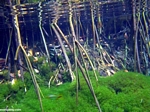
|
|
(07/06/2007) Destruction of mangrove forests could leave the world deprived of their important ecological services by the end of a century, warns an international team of scientists writing in the July 6th issue of the journal Science. Mangrove forests, which once covered more than 200,000 square kilometers of coastline, have been diminished by 35-86 percent in extent in locations around the world, according to the U.N. Food and Agriculture Organization, and are critically endangered or approaching extinction in 26 out of the 120 countries in which they are found.
[
Mangroves]
Metal workers recycle in attempt to escape poverty in Madagascar
(07/06/2007) Julie Larsen Maher, staff photographer for WCS visits a metal working community in Madagascar.
[
Madagascar]
China will not commit to CO2 limits
(07/06/2007) China will not commit to binding greenhouse gas emissions cuts, reports the BBC. Lu Xuedu, deputy director-general of China's Office of Global Environmental Affairs, told British parliamentarians that China does not presently have the "capability to make those commitments."
[
China]
Guatemala gets conservation boost
(07/06/2007) Guatemala's Eastern Maya Biosphere Reserve will receive $3 million in funding from the Wildlife Conservation Society, the Bronx Zoo-based organization announced Friday.
[
Happy-Upbeat environmental]
Rare three-legged tiger photographed in Sumatra
(07/06/2007) A WWF camera trap has captured photos of a three-legged Sumatran tiger on the Indonesian island of Sumatra. WWF says the rare tiger likely escaped from a snare. The big cat seems otherwise healthy.
[
Tigers]
Lush forests blanked Greenland 500,000 years ago
(07/05/2007) Rich boreal forests with butterflies and other insects flourished on Greenland within the past million years, reports a new study published in the July 6th issue of the journal Science.
[
Greenland-Arctic]
760,000 Chinese die a year from pollution

|
|
(07/04/2007) 760,000 Chinese die prematurely each year from polluted air and water, according to estimates to be released by the World Bank. Reuters reports that diarrhea and cancer from dirty drinking water cause 66,000 premature deaths a year, while outdoor air pollution kills 396,000 people per year. Indoor air pollution, mostly from coal-burning stoves and cooking oil, kills another 300,000. The Bank did not calculate death totals directly due to protests from the Chinese government which said that the figures could trigger social unrest. Instead the bank listed the economic costs of deaths from pollution, assuming each life is valued at 1 million yuan ($131,000).
[
China]
NASA maps newly proposed source of the Amazon River

|
|
(07/04/2007) NASA released a map showing the newly proposed source of the Amazon River, a change that would make it the longest river in the world. Last month Brazilian researchers proposed Mount Mismi, a snow-covered mountain in southern Peru as the source of the Amazon River. Previously, the generally accepted source was in northern Peru. If the revision holds, the length of the Amazon would exceed that of the Nile by roughly 60 miles (105 km). However the claim is likely to be contested.
[
Amazon]
Unprecedented deletion of a World Heritage Site in Oman
(07/04/2007) For the first time, UNESCO has delisted a site from its World Heritage List: the Oman Arabian Oryx Sanctuary. Joshua S. Hill, a new guest contributor to mongabay.com, reports on the development as well as the bald eagle's removal from the endangered species list and the disappearance of ponds in the Arctic.
[
Endangered species]
UNESCO lists rainforest parks of Madagascar as Heritage sites

|
|
(07/03/2007) UNESCO has listed six rainforest parks in Madagascar as World Heritage sites: Andohahela, Andringitra, Marojejy, Masoala, Ranomafana, and Zahamena. The announcement comes as the Indian Ocean island nation has moved aggressively to protect its biologically-rich forests from further degradation.
[
Madagascar]
Norway bans tropical timber
(07/03/2007) Concerned about deforestation rates in the world's most biodiverse forests, Norway has banned the use of tropical timber in all public buildings, reports the Rainforest Foundation Norway.
[
Logging]
Mongabay for kids now in Japanese
(07/03/2007) The rainforest information site for kids has launched in its 20th language: Japanese. I can still use help with dozens of other languages.
[
mongabay in non-English languages]
Travel photos in non-English languages [beta]
(07/03/2007) Beta launch of travel images in several non-English languages: cn, de, es, fr, it, ja, ko, pt, ru, ar, hr, cs, da, nl, fi, el, hu, no, po, ro, sv, tg, vi, tw.
[
Photos]
Researchers find large population of extremely rare monkey
(07/03/2007) team of scientists from WWF and Conservation International (CI) has discovered the world's largest known population of grey-shanked doucs (Pygathrix cinerea), a monkey ranked as one of the world's 25 most endangered primates, in Vietnam. The discovery is fueling that the species can be saved from extinction -- less than 1,000 of the monkeys are thought to remain.
[
Biodiversity | Happy-upbeat environmental | Primates]
Man-eating piranha are actually cowards
(07/01/2007) Despite their reputations as aggressive blood-thirsty carnivores, piranha schooling behavior is a defensive measure to protect against predators rather than an offensive hunting maneuver, reports new research presented at the Royal Society's summer science exhibition in London. Piranhas face many predators in their Amazon habitat, including caiman, freshwater dolphins, and giant fish like the pirarucu or arapaima.
[
Animal behavior]
Most popular mongabay.com news articles - June 2007
(07/01/2007) Interviews with Dr. Daniel Nepstad and John Cain Carter near the top.
[
Most popular articles]













